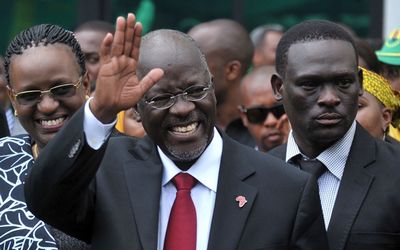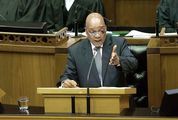Tanzania takes a bulldozer to graft
by Joseph Burite,
2016-02-17 05:48:04.0
BUSINESS is slow at Hamisi Haruna’s cafe in Tanzania’s commercial capital, Dar es Salaam, because the civil servants who used to while away the hours there now stay at their desks for fear of angering the man known as the "bulldozer": President John Magufuli.
"There are no customers," says Haruna, outside his restaurant on Sokoine Drive on the eastern fringe of the city. "This place used to be full all the time."
Since his inauguration three months ago, Magufuli has cancelled Independence Day celebrations and barred civil servants from sending Christmas cards as part of a campaign pledge to tackle corruption and curb waste of public resources. The money-saving measures generated a hashtag on Twitter that asked #WhatWouldMagufuliDo?
Tanzania, Africa’s third-biggest gold producer, ranks in the bottom half of Berlin-based Transparency International’s Corruption Perceptions Index, below other African countries such as Ivory Coast and Mozambique. Per capita income in the country of 49-million people is $955, while the sub-Saharan African average is $1,638, World Bank data shows.
On his first day at work, the president conducted an impromptu tour of the finance ministry’s offices, where he demanded to know the whereabouts of officials whose desks were unoccupied.
While Magufuli is soft-spoken, he earned a reputation as a hard-driving boss and was nicknamed "Tingatinga", Swahili for bulldozer, in his previous position as the country’s minister of works. "Who sits here? What is his name?" Magufuli asked officials at the finance ministry in Swahili, footage aired on the state-owned Tanzania Broadcasting Corporation showed. "You’re the boss here, where are the others? They’ve gone to drink tea?"
Magufuli has fired at least seven government agency heads since coming to office on November 5, including the head of the country’s anticorruption body, the chief of Tanzania’s railways and a top immigration official.
The dismissals signal the president’s intent to stamp his authority on the new government, says Ahmed Salim, an analyst with Teneo Intelligence. Under Magufuli’s predecessor, Jakaya Kikwete, perceptions of corruption in Tanzania had increased over the past four years, according to Transparency International.
Calls to Edward Hoseah, who was the executive director of the Prevention and Combating Corruption Bureau, went unanswered. Attempts to reach Reli Assets Holding for former MD Benhadard Tito’s contact details were unsuccessful.
Magufuli is "trying to distance how his government will do business compared to his predecessor," Salim says. "However, because corruption in Tanzania is a systemic issue, it is unclear how the high-profile sackings will translate to a real decrease in corruption in the public sector."
The president’s efficiency drive has also focused on tax collection. Takings exceeded 1.4-trillion Tanzanian shillings (R9.9bn) in December, beating the government’s target by 12%,according to Finance Minister Philip Mpango.
In November, the president suspended the head of the Tanzania Revenue Authority and ordered a probe into hundreds of shipping containers with goods worth 80-billion Tanzanian shillings that went missing at Dar es Salaam’s port. About two dozen port employees were fired or suspended.
Improved tax collection means Magufuli can deliver on his campaign pledges, says Finance Ministry Permanent Secretary Servacius Likwelile.
The Treasury has spent 37.5-billion on school grants, 46.3-billion on water projects, and 80-billion on an electricity plant in Dar es Salaam over the past three months — money that wasn’t previously available.
The economy may expand 7.2% this year, compared with 7% last year, according to the Treasury.
The government intends to cut its budget shortfall in the fiscal year beginning July 1 and increase spending.
The reforms will have to cut deeper if Tanzania’s mainly agrarian economy is to transform into an industrial one, says Haji Semboja, an economics professor at the University of Dar es Salaam.
"The economy is weak because laws are not well-enforced. We remain a consuming economy dominated by imports," he says.
While many Tanzanians laud Magufuli’s zeal, curbing corruption will require overhauling the civil service’s entire work culture and moral fabric, a task that will be impossible for the president to execute single-handedly, according to Nicholas Lekule, manager for policy and budget analysis at Policy Forum.
"The way he operates, his move is more of a one-man show and as such it may not yield much," says Lekule. "What is interesting, however, is that some public officials have been held to account, which may instigate some sense of accountability."
Bloomberg

Tanzanian President John Magufuli pledged to tackle corruption when he came to office in November. Since then the president, nicknamed ‘Tingatinga’ (bulldozer), has fired at least seven government agency heads. Picture: REUTERS/SADI SAID
BUSINESS is slow at Hamisi Haruna’s cafe in Tanzania’s commercial capital, Dar es Salaam, because the civil servants who used to while away the hours there now stay at their desks for fear of angering the man known as the "bulldozer": President John Magufuli.
"There are no customers," says Haruna, outside his restaurant on Sokoine Drive on the eastern fringe of the city. "This place used to be full all the time."
Since his inauguration three months ago, Magufuli has cancelled Independence Day celebrations and barred civil servants from sending Christmas cards as part of a campaign pledge to tackle corruption and curb waste of public resources. The money-saving measures generated a hashtag on Twitter that asked #WhatWouldMagufuliDo?
Tanzania, Africa’s third-biggest gold producer, ranks in the bottom half of Berlin-based Transparency International’s Corruption Perceptions Index, below other African countries such as Ivory Coast and Mozambique. Per capita income in the country of 49-million people is $955, while the sub-Saharan African average is $1,638, World Bank data shows.
On his first day at work, the president conducted an impromptu tour of the finance ministry’s offices, where he demanded to know the whereabouts of officials whose desks were unoccupied.
While Magufuli is soft-spoken, he earned a reputation as a hard-driving boss and was nicknamed "Tingatinga", Swahili for bulldozer, in his previous position as the country’s minister of works. "Who sits here? What is his name?" Magufuli asked officials at the finance ministry in Swahili, footage aired on the state-owned Tanzania Broadcasting Corporation showed. "You’re the boss here, where are the others? They’ve gone to drink tea?"
Magufuli has fired at least seven government agency heads since coming to office on November 5, including the head of the country’s anticorruption body, the chief of Tanzania’s railways and a top immigration official.
The dismissals signal the president’s intent to stamp his authority on the new government, says Ahmed Salim, an analyst with Teneo Intelligence. Under Magufuli’s predecessor, Jakaya Kikwete, perceptions of corruption in Tanzania had increased over the past four years, according to Transparency International.
Calls to Edward Hoseah, who was the executive director of the Prevention and Combating Corruption Bureau, went unanswered. Attempts to reach Reli Assets Holding for former MD Benhadard Tito’s contact details were unsuccessful.
Magufuli is "trying to distance how his government will do business compared to his predecessor," Salim says. "However, because corruption in Tanzania is a systemic issue, it is unclear how the high-profile sackings will translate to a real decrease in corruption in the public sector."
The president’s efficiency drive has also focused on tax collection. Takings exceeded 1.4-trillion Tanzanian shillings (R9.9bn) in December, beating the government’s target by 12%,according to Finance Minister Philip Mpango.
In November, the president suspended the head of the Tanzania Revenue Authority and ordered a probe into hundreds of shipping containers with goods worth 80-billion Tanzanian shillings that went missing at Dar es Salaam’s port. About two dozen port employees were fired or suspended.
Improved tax collection means Magufuli can deliver on his campaign pledges, says Finance Ministry Permanent Secretary Servacius Likwelile.
The Treasury has spent 37.5-billion on school grants, 46.3-billion on water projects, and 80-billion on an electricity plant in Dar es Salaam over the past three months — money that wasn’t previously available.
The economy may expand 7.2% this year, compared with 7% last year, according to the Treasury.
The government intends to cut its budget shortfall in the fiscal year beginning July 1 and increase spending.
The reforms will have to cut deeper if Tanzania’s mainly agrarian economy is to transform into an industrial one, says Haji Semboja, an economics professor at the University of Dar es Salaam.
"The economy is weak because laws are not well-enforced. We remain a consuming economy dominated by imports," he says.
While many Tanzanians laud Magufuli’s zeal, curbing corruption will require overhauling the civil service’s entire work culture and moral fabric, a task that will be impossible for the president to execute single-handedly, according to Nicholas Lekule, manager for policy and budget analysis at Policy Forum.
"The way he operates, his move is more of a one-man show and as such it may not yield much," says Lekule. "What is interesting, however, is that some public officials have been held to account, which may instigate some sense of accountability."
Bloomberg

















Change: -0.36%
Change: -0.29%
Change: 1.81%
Change: -0.81%
Change: -1.12%
Data supplied by Profile Data
Change: 0.00%
Change: 0.00%
Change: -0.36%
Change: 0.00%
Change: 0.00%
Data supplied by Profile Data
Change: 0.25%
Change: 0.10%
Change: 0.42%
Change: 0.66%
Change: -0.33%
Data supplied by Profile Data
Change: 0.00%
Change: 0.00%
Change: 0.00%
Change: 0.00%
Change: 0.00%
Data supplied by Profile Data